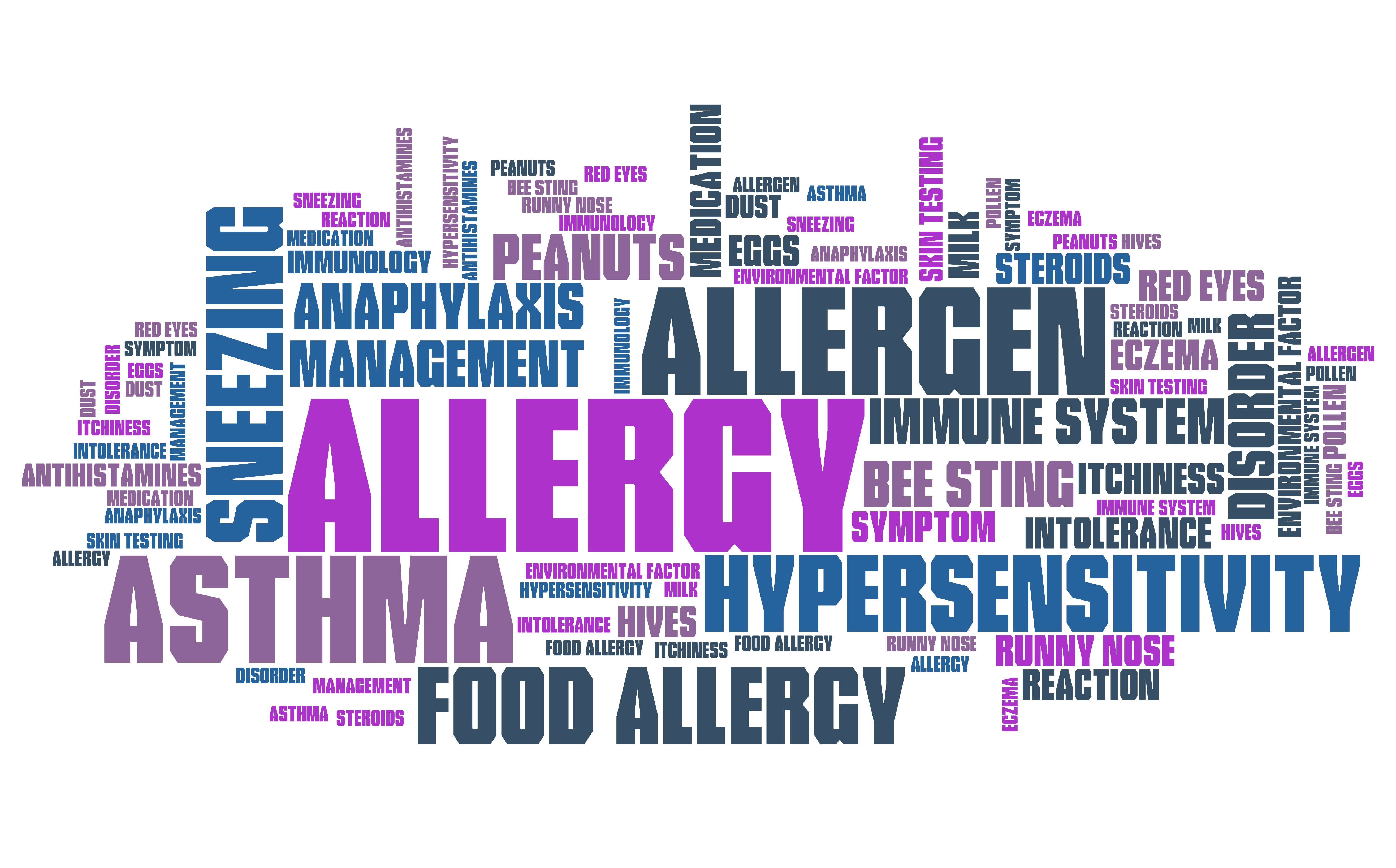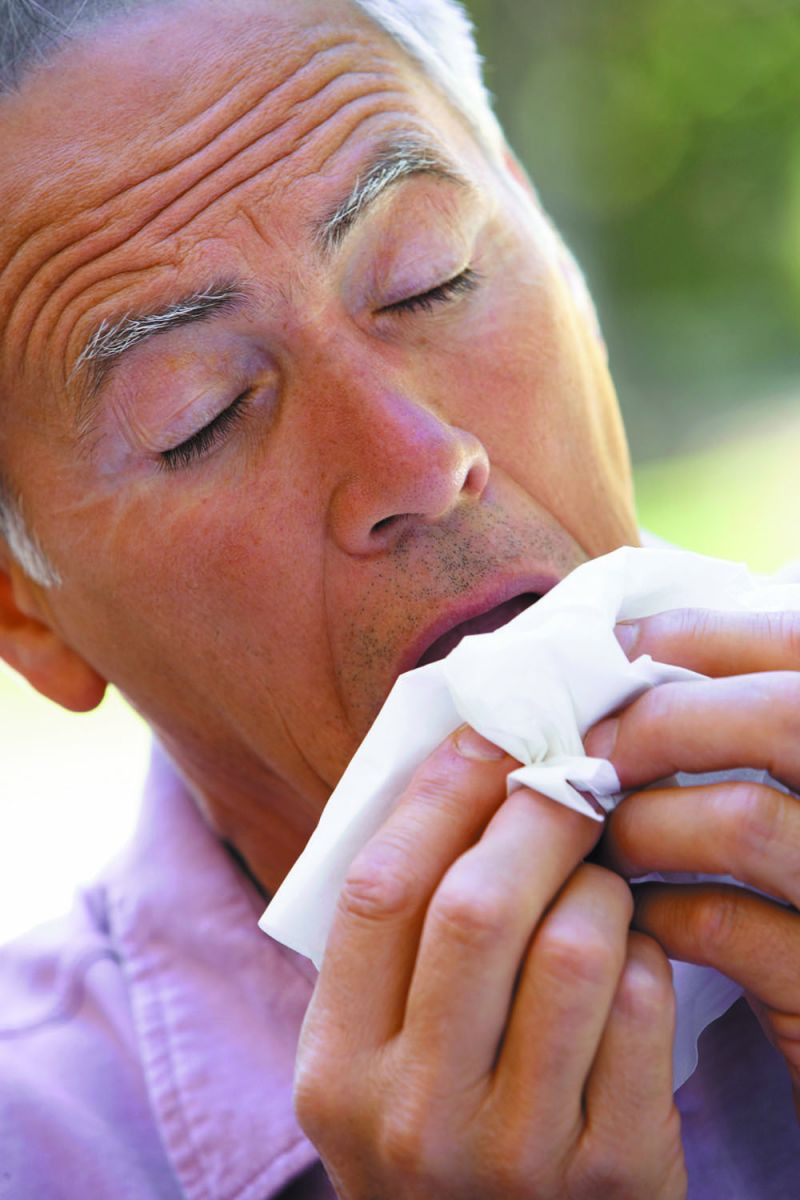
Tips to leverage neuroplasticity to maintain cognitive fitness as you age

Can white noise really help you sleep better?

Celiac disease: Exploring four myths

What is prostatitis and how is it treated?

What is Cushing syndrome?

Exercises to relieve joint pain

Think your child has ADHD? What your pediatrician can do

Foam roller: Could you benefit from this massage tool?

Stepping up activity if winter slowed you down

Common causes of cloudy urine
Allergies Archive
Articles
Red meat allergy spread by ticks: A link to heart disease?
Research we're watching
A bite from a lone star tick can trigger an unusual allergy that causes hives, swelling of the throat and lips, or an upset stomach when you eat red meat. But that's not all: people with this rare red meat allergy may be particularly prone to narrowed, stiff arteries in the heart, a new study finds.
Researchers analyzed blood samples from 118 adults living in Virginia and found that 26% had evidence of a red meat allergy (that is, they had antibodies to a molecule called alpha-gal, the main allergen in red meat). Lone star tick saliva may contain alpha-gal, so when a tick bites a person, it may trigger an immune response by the body, which then recurs when the body encounters alpha-gal in red meat. Lone star ticks are found throughout the southeastern and eastern United States.
Giving antacids and antibiotics to babies can lead to allergies
The overuse of antibiotics and antacids can lead to problems regardless of age, but if given to babies it can contribute to allergies and asthma as children grow.
Nine in 10 homes have three or more allergens
Research we're watching
Some new research shows good reason to focus on reducing the number of indoor allergens in your home. A new study published in the Nov. 30, 2017, issue of The Journal of Allergy and Clinical Immunology found that more than 90% of nearly 7,000 homes studied had three or more detectable allergens, from a list of eight common allergens. In addition, some 73% of homes had one allergen found at levels researchers defined as "elevated." The researchers used data from the 2005–2006 National Health and Nutrition Examination Survey. The eight allergens were cat, dog, cockroach, mouse, rat, mold, and two types of dust mites. Factors that led to higher levels of indoor allergens included pets and pests. Certain types of homes were also more likely to have higher allergen levels, including older homes, rental homes, mobile homes, and homes in rural areas.
Got an egg allergy? No need to skip that flu shot next year
Research we're watching
Image: © grinvalds/Getty Images
If you have an egg allergy, you may have been told not to get a flu shot. That's because the vaccine is grown in eggs and may contain a small amount of egg protein, which — it was feared — could trigger an allergic reaction. But a new guideline from the American College of Allergy, Asthma and Immunology (ACAAI) dispenses with that old advice and says even people with an egg allergy should roll up their sleeves and get the shot to protect themselves from the flu.
"When people get flu shots, health care providers often ask if they are allergic to eggs," allergist Dr. Matthew Greenhawt, chair of the ACAAI Food Allergy Committee and lead author of the practice parameter, said in a written release. "We want health care providers and people with egg allergy to know there is no need to ask this question anymore, and no need to take any special precautions. The overwhelming evidence since 2011 has shown that a flu shot poses no greater risk to those with egg allergy than those without." Numerous studies have found that patients with egg allergy — even those with life-threatening allergies to egg — have gotten the shot and did not suffer any ill effects. This suggests there isn't enough egg protein in the vaccine to cause a reaction.
Is your home a haven for allergens?
News briefs
Spring is on the way, which means allergy season is around the corner. But it's not just springtime pollen that can trigger a runny nose and itchy, watery eyes. Indoor allergens — such as mold, pet dander, and dust mites — can lead to allergy symptoms in some people or make allergy and asthma symptoms worse. And a study published Nov. 30, 2017, in the Journal of Allergy and Clinical Immunology found that 90% of homes have three or more allergens, with at least one allergen at high levels in 73% of homes. Researchers combed through information collected in a large national survey that also assessed allergen levels in bedroom dust collected from nearly 7,000 U.S. households. The presence of pets and pests (cockroaches, rodents) were the major contributors to high levels of indoor allergens in participating homes. Study authors recommend reducing indoor allergens by sealing entry points for pests, keeping pets out of the bedroom, and making sure each week to wash bedding in hot water and vacuum carpets and upholstered furniture.
Is it possible for adults to develop food allergies?
Ask the doctors
Image: © piotr_malczyk/Thinkstock
Q. Can adults develop food allergies, or is this possible only in children?
A. While food allergies are more common in children, adults can, and sometimes do, develop food allergies. You can become allergic to a food you've eaten without a problem for years, or a childhood allergy that disappeared can re-emerge. Certain foods are more likely to trigger allergic reactions than others, such as tree nuts, peanuts, shellfish, milk, and wheat.
Sniffing out sinus relief
The inflammation of chronic sinusitis can be more than just an annoyance. Here's what you can do about flare-ups.
Stuffy nose? Constant blowing? A head on the verge of exploding? Everyone battles clogged sinuses at times, and often the discomfort goes away after a few days. However, if the condition lingers or becomes more severe, you could be battling chronic sinusitis, which can affect your quality of life.
"Besides the stress of dealing with the symptoms, the condition can interfere with your sleep, lead to depression, and keep you from being active," says Dr. Ahmad R. Sedaghat, an otolaryngologist with Harvard-affiliated Massachusetts Eye and Ear Infirmary.
Think twice before going gluten-free
News briefs
Image: © Elenathewise/Thinkstock
Unless you have celiac disease, banning gluten from your diet won't boost your heart health—and may actually hurt it, suggests an observational study published May 2, 2017, in The BMJ. Gluten is a protein in wheat, barley, and rye. In people with celiac disease, eating gluten triggers the body to attack the small intestine, causing inflammation and leading to malnutrition and gastrointestinal distress. The inflammation, in turn, can increase heart disease risk. In these people, eliminating gluten stops the attack on the small intestine, reduces inflammation, and helps reduce heart disease risk.
A Harvard research team wondered whether people without celiac disease might also lower their heart disease risk by eliminating gluten from their diets. In a study of more than 110,000 healthy men and women followed for about 25 years, the researchers did not find a clear difference in the number of heart attacks that occurred among people who ate the most gluten each day, compared with people who ate the least. However, in people who avoided gluten by avoiding whole grains — which contain valuable nutrients — the risk of heart disease rose. So, if you're among the great majority of people who don't have celiac disease, avoiding gluten won't reduce your risk of heart disease, and it might increase the risk if it means you cut back on whole grains.
The secret to an easier allergy season
Fighting back against tiny allergens before they strike can help you avoid or reduce symptoms.
Image: iStock
The spring allergy season begins next month, and if you want to avoid symptoms, you must act now. "Pretreating allergies will lead to better control of symptoms, and maybe prevent symptoms from showing up," says Dr. Ahmad Sedaghat, an ear, nose, and throat specialist at Harvard-affiliated Massachusetts Eye and Ear Infirmary.
Automatic defenses
When spring allergens—typically pollen from oak, elm, birch, poplar, or maple trees, depending on where you live—float through the air and reach the nose, the body sometimes overreacts. Mast cells in the lining of the nose mistake the harmless tree particles for dangerous invaders, and summon help by releasing chemicals such as histamine and tryptase, which then recruit more immune system cells to the battle.

Tips to leverage neuroplasticity to maintain cognitive fitness as you age

Can white noise really help you sleep better?

Celiac disease: Exploring four myths

What is prostatitis and how is it treated?

What is Cushing syndrome?

Exercises to relieve joint pain

Think your child has ADHD? What your pediatrician can do

Foam roller: Could you benefit from this massage tool?

Stepping up activity if winter slowed you down

Common causes of cloudy urine
Free Healthbeat Signup
Get the latest in health news delivered to your inbox!
Sign Up










